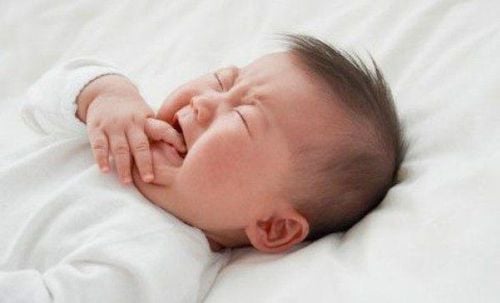This is an automatically translated article.
When babies are born, their sleep time can last up to 20 hours/day. However, after a few weeks, babies may stay awake and cry for up to several hours. It is very common for 1-month-old babies to cry at night. So what should a 1-month-old baby cry at night?
1. Normal sleep in infants aged 0-1 months
Baby's sleep at this stage is unpredictable during the first month, often punctuated by short periods of wakefulness followed by naps and longer naps. Some children seem to have day and night confusion. Crying while sleeping is normal.
Every 2-3 hours the baby usually wakes up and sometimes more often to eat.
Expose your child to natural light during the day, establish a routine that helps them adjust to their sleeping patterns. However, for most children this age, a regular sleep schedule or long nighttime sleep isn't possible.
2. When will the baby stop crying at night?
At first, parents may notice that 1-month-old babies have night crying beginning around 2-3 weeks of age and night crying may peak around 6 weeks of age. This period will probably correspond to a growth spurt and some increased feeding. If you're getting to that point, keep your hopes up that things are about to get better!
Although, there is no definite time frame to guarantee when an infant will pass this "witching hour", it usually ends around 3-4 months of age.
3. What is the cause of a 1-month-old baby crying at night?
3.1 The central nervous system has not yet matured The central nervous system of the newborn is not yet complete, has not yet formed the conditioned reflex to wake up and sleep at night, and is susceptible to external stimuli such as sound, light and light. light causes a sudden cry. The fetus stays in the dark for 24 hours in the womb, regardless of day and night. Under normal circumstances, the conditioned reflexes of the neonatal cortex gradually begin to form after 15 days of birth. When your baby sleeps too much during the day, he will cry more at night.
3.2 1-month-old babies often cry at night because of the habit Parents always tolerate their children, shaking, comforting, comforting and carrying their children around the house when they are fussy. Over time, children consider the sleep of parents as their right, no matter how tired you are, the child will cry more and more and longer.
Parents always can't bear to hear their baby's loud cries, finally have to compromise. For such children, parents should train them to stop crying on their own.
3.3 Crying due to overstimulation The child suddenly becomes violently fussy during the night, the baby does not stop crying despite being comforted in many ways. Crying with weak limbs, bending over, sweating a lot, crying almost screaming, even hysterical crying. The main causes of this condition are because children are “feared” such as watching scary TV programs during the day, falling from a height, being threatened by others, hitting, scolding, exercising. strong before bedtime, or overstimulated, etc.
3.4 1-month-old baby often cries at night because of stomach upset causing stomach bloating and abdominal pain when sleeping.
However, it is also possible that your baby is too sensitive to stimulation and is not yet able to self-soothe. Although stressful for caregivers, colic is unlikely to cause any long-term harm or medical problems for the baby.
3.5 Active Pinworms Right after a child goes to bed at night, about half an hour to two hours. Suddenly there is a strong cry, bending, scratching the anus with hands, the cause may be pinworm disease. When the baby is asleep, the pinworms will crawl to the folds of the baby's anus or vulva to release eggs, causing the baby to itch and cry. In this case, the parents can open the anus or vulva of the baby girl to examine.
3.6 1 month old baby fussy at night due to hunger Hunger is one of the main reasons why babies cry at night. Newborns grow quickly and their stomachs are small, so they can't hold large amounts of milk. Therefore, parents should wake the baby several times during the night to feed the baby. Usually, babies feed continuously and the times of feedings are also very close together. By about 3 months of age, the interval between feedings will be from 2 to 4 hours.
3.7 Nighttime Crying Baby Allergies When a baby's fussiness is persistent and not related to hunger, sleep or general discomfort, cow's milk protein allergy may be the cause..
3.8 Colic
Colic hay Also known as fussy infant syndrome, babies cry because of colic and this often signals a period of depression in the baby. If you notice your baby crying for 3 hours or more, three days a week and for three weeks or more, it's time to take your baby to the doctor for advice and to rule out any medical problems.
3.9 A 1-month-old baby cries at night because it's too hot or too cold Babies may start to feel cold or hot at night and need help from parents. If the temperature changes quickly, your baby will get upset and cry.
3.10 Crying at night due to an illness When the body is not well, adults are easy to get tired, lose sleep and so are babies. Children may cry at night if they have one of the diseases such as colds, ear infections, canker sores, mouth ulcers, digestive disorders, intussusception, malnutrition, rickets, iron deficiency anemia, etc. .. The cause of fussiness is more complicated, so it is necessary to find the cause and treat it in time.
In addition to the above reasons, other reasons why babies cry at night are dirty diapers, discomfort after defecation, loss of pacifiers, uncomfortable bedding,...
4. What to do when a 1-month-old baby cries at night?
Each child has a different cause of night crying, as well as a different treatment. Parents can try some of the following measures to help babies reduce nighttime crying and get used to the environment outside the womb:
Limit napping. Parents should not let their baby nap for more than 3 hours at a time during the day. Keep the lights dim and the room quiet when feeding and changing at night. Help your baby form the habit of waking up during the day and sleeping at night. Put your baby in a bassinet or walk and rock them. This reminds the baby in the womb and reassures them. Turn on white noise. You can try using a white noise machine, a fan, or recording your heart rate. These sounds remind the baby to be in the womb and can help calm him down. Don't let your child watch thrilling TV shows, don't tell them scary stories, and don't scare them before going to bed. Children should not eat too much at dinner. Wait at least 2 to 2.5 hours from the start of one feed to the start of the next. Eating too much can make your baby uncomfortable because the stomach is too small. If parents do not detect and suspect that the child is fussy due to pinworms, they can apply pinworm cream to the anus after the child sleeps. However, consult your doctor for effective use. Hold the child in the arms on their left side or belly. This can help with their digestion or make their stomach feel better. Remember to put your baby on his or her back in the crib if they fall asleep. Consult your pediatrician to determine if your baby's crying is due to a cow's milk protein allergy. In addition, parents can check their baby's needs. Sometimes there's no obvious reason why babies cry at night. Therefore, parents need to check if the child is in the following situations?
Hungry: Track when your baby eats and watch for early signs of hunger like thumb sucking. Cold or hot: Check baby's clothes and room temperature Dirty or damp: Check baby's diaper for change. Vomiting a lot: Gastroesophageal reflux disease (GERD) can make babies fussy. Too stimulating. Try reducing noise and light. Illness: Parents please take the baby's temperature. Make sure the child does not have any other signs of illness. Call your pediatrician right away if your baby under 2 months of age has a high fever. Take care of yourself. Caring for a 1-month-old baby who cries at night is exhausting. If you're feeling overwhelmed, call a friend or relative to take care of your baby while you rest. If no one helps, put the baby in the crib, close the door, and rest for 10 minutes. Try to do something relaxing during those 10 minutes.
5. When should a baby cry at night see a pediatrician?
Crying in babies is not usually a medical problem. However, parents should still rule out any medical reason for their baby's night crying. Contact your pediatrician if your child has any of the following symptoms:
Fever over 38 degrees Celsius on rectal temperature Not as alert and active as usual Weight loss or not gaining weight Vomiting Stools liquid or bloody Don't eat Bad sucking Don't stop crying, no matter how your parents comfort you? It can be said that the condition of 1-year-old babies crying at night is caused by many reasons. Therefore, if the parents or caregivers see the baby crying at night and using many measures but still not improving, it is necessary to take the child to a medical center to examine and determine the cause. From there, the doctor will give specific advice.
With many years of experience in examining and treating diseases in children, now the Pediatrics Department at Vinmec International General Hospital has become one of the major health care centers, capable of examining screening and treatment of many diseases in children. Therefore, if the child shows signs of prolonged night crying, parents can take the child to Vinmec International General Hospital for examination and receive support and advice from doctors and health experts.
Please dial HOTLINE for more information or register for an appointment HERE. Download MyVinmec app to make appointments faster and to manage your bookings easily.













